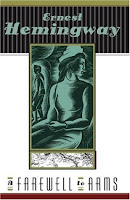218. A Farewell to Arms by Ernest Hemingway*
Ernest Hemingway's A Farewell to Arms (Scribner, 1929; 332) has been on several 'must-read' lists. Usually I'm not drawn to recently-published much-talked about books; however, when it comes to classics, it's different. This is one of those books that are easy, and yet difficult, to talk about. Easy in the sense that the story is not complicated and it is beautiful; difficult because Hemingway's prose defies description.
The story is set in the midst of the World War I, on the Italian front. Lieutenant Henry, is an American ambulance driver working with the Italian forces. Henry meets Catherine Barkley, through a friend, and what blossomed from that meeting was innocent love. Though, Henry had gone into the relationship with a non-staying mentality, meeting the vernal and venerable Catherine exuding innocence and genuine affection, his ulterior motive extinguished in a flash. Slowly, he found himself fall deeper and deeper in love; a love so pure that only Hemingway's prose could capture its innocence, its pureness and its freshness. The prose is calm, melancholic, detailed, terse and touching.
Hemingway produces, in the tiniest detail, the events on the battlefield and also on its peripherals: the struggle through the mud, the bog, the near death incidences, the swim across the river ... running away from authorities and the journey across the river into safety. Water plays an important role in the whole story; it signifies adversity and freedom, or the route to freedom.
Hemingway produces, in the tiniest detail, the events on the battlefield and also on its peripherals: the struggle through the mud, the bog, the near death incidences, the swim across the river ... running away from authorities and the journey across the river into safety. Water plays an important role in the whole story; it signifies adversity and freedom, or the route to freedom.
As the War wore on and defeat to the Italians, first manifesting itself in a sudden retreat, seemed imminent, Henry realised that he must decide which way his life must take: remain working as an ambulance driver or desert the army, which comes with its own troubles (of arrest), and become the portal for creation. Without a dither, Henry went for Catherine and the two crossed, in a boat, over to Switzerland, leaving behind friends (in Italy) and family (in America and Britain, respectively). The similarity between Henry's role as an ambulance driver and as a husband is striking. In both, there's a possible life to be saved or to be created and nurtured; but the success of either cannot easily be assessed.
The beauty of this book is the way Hemingway handled the Catherine-Henry love in the midst of the raging war. The ying-yang, love-war, calm-rage, rain-explosion, dichotomy was palpable; even the British Catherine complemented the American Henry. The language is sparse and the taciturn dialogue has been constructed in such a way as if the characters are in dreamy states, as if they really don't want to talk or that they don't have much to say to each other; as if they understand themselves telepathically, especially Henry and Catherine. However, there are times the reader felt that Catherine wanted evidence of Henry's love, was scared of desertion owing to incidences in her past. This experience-influenced behaviour made her seem childish in her conversations; thus, unintentionally making Henry the determinant of how their relationship turn out.
The parallels between Henry-and-Catherine's love and the raging war were clear; they both ended in pain and loss, for in war even the victor loses. It's an interesting read but if you read it with a twenty-first century mind, you would be disappointed, especially if you're a feminist aficionado. Usually, people criticise a book using current trends and claim they didn't love it. It's not like mathematics where ancient questions could still be solved with modern techniques. This is a snapshot of a society at a point in time and should be read as such. Regardless, it's recommended.
_________________
*This is the 70th book for the year and it officially marks the end of this year's reading goal
_________________
*This is the 70th book for the year and it officially marks the end of this year's reading goal




"calm, melancholic, detailed, terse and touching"
ReplyDeleteThe published should put that on the book's cover. That just about sums it up!
thanks Tom. I really appreciate it.
DeleteA powerful review, Nana. You know it used to be a Lit book back in the 80s when I was in secondary school, though my school did not select it for us. Some of my friends in other schools read it. I woudl love to read it after your fine review.
ReplyDeleteA blessed New Year to you